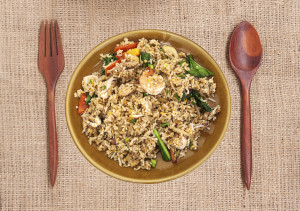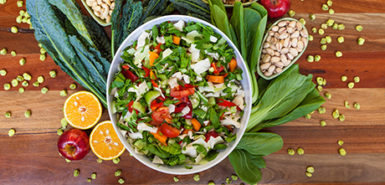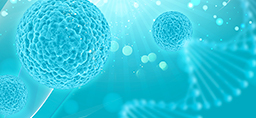
Kevin Douglas is excited to go to the gym.
He’s been a fitness enthusiast for as long as he can remember. But this will be his first workout in a long time.
It all started when he thought he’d scratched the inside of his mouth with an aggressive tortilla chip. When his mouth was still bothering him a few weeks later, the Kentwood resident called his dentist. That visit lasted for more than an hour.
When the dentist finally stepped back, he said, “We need to get a biopsy.” Douglas was stunned. “I didn’t even know what he was doing at the time, but something like that never even occurred to me.”
At 56 years old and in picture-perfect health, he was diagnosed with cancer of the sinus and jaw—a form commonly associated with smoking. Douglas has never smoked.
Tackling cancer head-on
Shocked by the out-of-the-blue diagnosis, Douglas prepared to tackle cancer. Whatever that meant.
He began working with Spectrum Health radiation oncologist, Eric Buth, MD, surgeon Darryl Elzinga, MD, and Latha Polavarum, MD, medical oncologist.
Then he was introduced to Stephanie Patterson, RD, RDN, CSO a registered dietitian and nutritionist who is also a certified specialist in oncology nutrition. Patterson dedicates her career to cancer patients at the Spectrum Health Cancer Center at Lemmen-Holton Cancer Pavilion.
“I had already had my surgery when I met Stephanie,” he recalled. “My cancer was so aggressive my surgeon, Dr. Buth, opted to remove part of my jaw and roof of my mouth right away, rather than starting with treatment.
Having faced that battle, and bolstered by Dr. Buth’s skill and attentive care, Douglas was optimistic.
“With all of that already behind me, I was hard-headed (about Stephanie) at first,” he said. “I was a health and fitness buff, I knew how to eat right. And what I’d already put behind me seemed to be the tough part. To be honest, I thought, ‘I don’t need a nutritionist.’”
Popular cancer nutrition classes
FORC: Fight Our Risks for Cancer: Nail nutrition knowledge! Learn which foods can help protect your body from getting cancer. Using the same approach, learn how anti-cancer eating has positive effects on cancer survivorship when the dust has settled and you are on the road to recovery.
SPOON: Strength & Power Optimized with Our Nutrition: Get a handle on which food choices have the power to help fight side effects from chemo, radiation and various types of cancer surgeries.
PLATE: Pick up Lite Appetizing, Tasty Edibles: Think of this as an overall cancer-fighting food sampling session, Costco style. With a fun, food-demo setup, Patterson offers food samples, recipes and tips that can have positive effects on cancer. Arrive early as this one draws crowds.
Little did he know at the time, but partnering with a specialized dietitian turned out to be a crucial turning point in his cancer journey.
The Spectrum Health Cancer Center‘s team of oncology dietitians work with a team of oncology professionals to address the vast range of needs of cancer patients. They work one-on-one with patients and offer classes that not only help patients eat well to fight their personal battle, but end up serving as upbeat, social support groups.
When Patterson met Douglas for the first time, she suggested he get a feeding tube to prepare for what was ahead.
“I flat out said, ‘No.’ I would not need a feeding tube,” he said. “She cheerfully said, ‘OK.’”
Douglas appreciated that Patterson seemed happy to listen and remained open to his thinking and preferences.
Douglas recalled, “When I started losing weight I wasn’t concerned; it was part of process. Because I was radiated from mid-nose to throat, the radiation affected my ability to swallow. It was like a bad sunburn inside my throat. But each week, she was there, checking my weight and asking how I was feeling. The first couple times I thought it was all a piece of cake.”
As Douglas got to know Patterson, he started listening a bit more.
Patterson’s knowledge was giving him new information that could help in fighting this disease. She offered detailed tips on the importance of good nutrition during concurrent radiation and chemotherapy.
Patterson recalled, “We discussed adequate calories, protein, hydration and nutrients. We also talked about how he could achieve his personal goals with food, even in the face of such side effects (nausea, pain with swallowing, constipation, diarrhea, taste alterations and dry mouth), he knew the basics; together we honed them to apply to this situation.”
She had his attention.
“She reminded me that radiation is cumulative,” he said. “She told me that you can be sailing along, and just like that, it hits, and you can no longer swallow. She told me if I hadn’t chosen to have a feeding tube placed before that happened, I’d find myself in a bad situation.”
With each interaction, Douglas noticed how Patterson supported him, “yet, she continued to tell me about the benefits of being able to boost my nutrition with a feeding tube so I could heal faster and have more energy. It was starting to make sense, but she never pushed beyond where I was at the time.”
Douglas knew his mouth and throat were making it increasingly difficult and uncomfortable to eat, so he remembered her earlier concerns. Then, Patterson made the point that scheduling the feeding tube procedure takes time.
“I hadn’t thought of those details,” Douglas said. “But I had come to trust Stephanie and believed she was looking out for my best interests. So I agreed.”
Patterson immediately set about getting his procedure scheduled.
“It was so strange,” Douglas recalled. “Less than a week after I had the feeding tube placed, I fell apart, I could no longer swallow or eat at all. Luckily, I had the feeding tube already going. Stephanie had been completely right, and just as she’d warned, it happened fast. Because I’d gone ahead, she was able to immediately shift gears to make sure that I got the nutrition I desperately needed through the tube.”
With the tube in place, Patterson assessed his nutrition goals and helped him learn how to manage it.
Let the healing begin
Finally, Douglas’ radiation therapy was complete. He wanted nothing more than to leave behind all reminders of his battle and get back to his life.
His medical team, however, wanted him to keep the feeding tube for a while longer. He knew where he would go to talk about it.
“I went to Stephanie and I told her I absolutely needed to mentally move on and get it out of there. Period. She listened and accepted what I was saying,” Douglas said. “I appreciated that, and it did wonders for my outlook.”
The tube was removed, and Douglas knew that he could still count on Patterson’s help for the next phase of his recovery.
“She counseled me on how to relearn to eat, what to eat and how to do it safely,” Douglas said. “Today, I am able to eat, though I’m still building up to dry foods like breads. Pancakes, hot dogs, dark chicken, eggs—all on the menu. I have 80 percent of my energy back and I know Stephanie will be there to help me regain some of the 40 pounds I lost, whenever I need her.”
A dietitian’s role in cancer care
“The very detailed knowledge we gain through the oncology nutrition specialty offers powerful ways to help patients outsmart cancer struggles,” Patterson said. “Even if we can’t eliminate symptoms or side effects, we can work hard to fight them. Nutrition plays a huge role in the journey, on many levels.”
It turns out, Patterson explained, that cancer-preventive nutrition, cancer-specific nutrition (i.e. colon cancer versus breast cancer) and post-chemotherapy nutrition vary greatly in focus.
“If you know surgery lies ahead, we may want to beef up your protein levels to sustain you after the surgery,” she said. “If you lose part of your intestines or stomach to cancer, you must learn a whole new way of eating. If you are going through chemo, you may have sores in your mouth that makes eating painful. If you need a bone marrow transplant, food safety becomes absolutely critical. These are examples of the details we understand and can help you address.”
 /a>
/a>
 /a>
/a>
 /a>
/a>
Very interesting and inspiring article on a cancer I know very little about.
After reading this, I’m going to go get my teeth checked, something I haven’t done in awhile. I knew nothing about this kind of cancer. Thank You for this article…